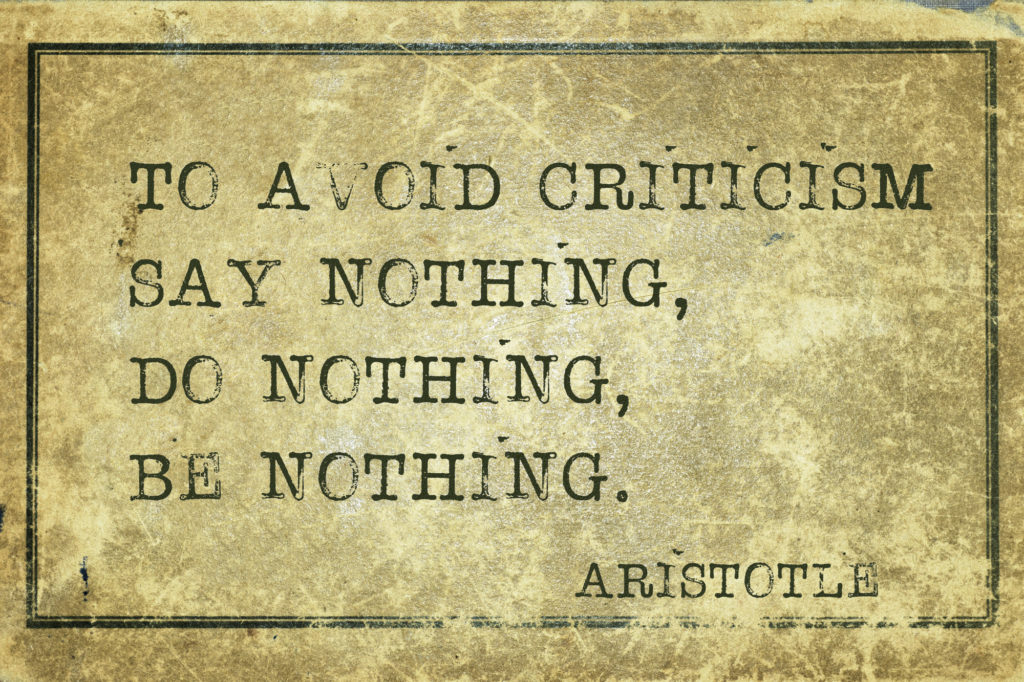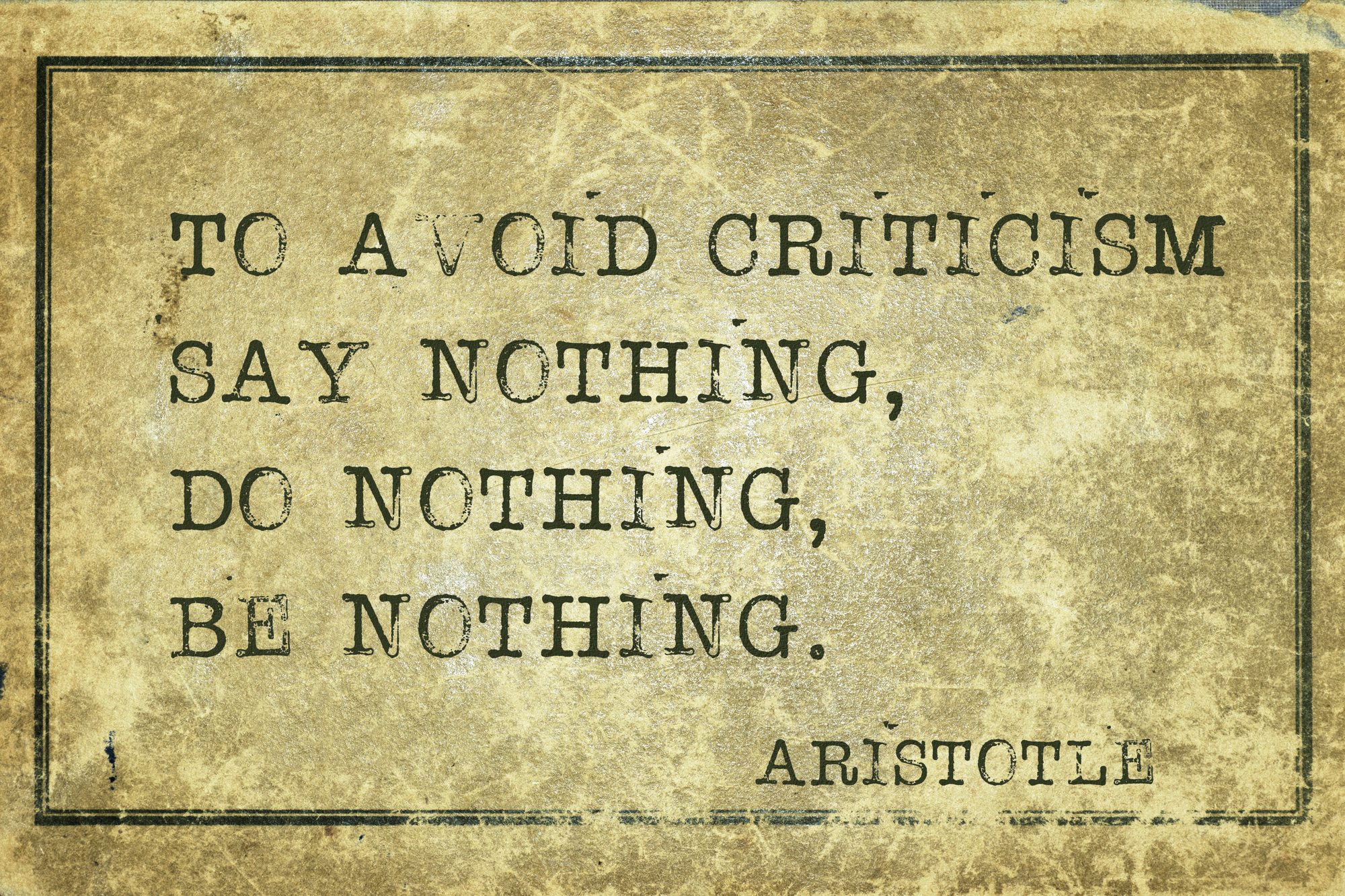
The fear of criticism robs a person of their initiative, destroys imagination, limits to ambition, extin-guishes dreams, steals self-reliance, and does, Lord only knows how much more damage.
-Napoleon Hill
Have you ever given a speech, lead a breakout, or shared your art and had it evaluated? Have you ever felt the fear of criticism?
If you are like me, you are very gracious when the results of the evaluations are given to you. And I bet you are like me you want to show how cool you are and not even take a peek at them until absolutely no one is around. For me, I will get to the bathroom or some other private space as soon as I can to see how I did. Don’t just love going through them and reading all of those affirming words. You’re giving yourself high five and tell yourself, “I killed it today!” That is until your alert eyes open wide when you read those, shall we say less than stellar comments. Immediately you begin to doubt yourself, and if you are not careful, you will spin into the death spiral of self-pity.
The truth is, anytime you put your head above the crowd there is the potential that you will become a target of criticism. The fear of criticism can be a show-stopper, but it doesn’t have to be. I hope that as you continue to lean into life, you will take the risk to live the life you were intended to live.
Let’s jump in! Let’s look at some tools that will help you crush the fear of criticism.
Six Strategies to help you deal with crush criticism.
Tip #1—People are going to criticize you no matter what you do. So why not give them something to talk about? As you grow, become more visible, and share your gifts, vision, and expertise, others will criticize.
As you step into this adventure of pushing back the fear of criticism you will only have two options:
Option #1— Gripe, complain, moan and groan. Complain about how bad things are and how we should all just love and respect for each other. FYI: it will do nothing but make you more miserable.
Option #2— Accept the fact that people will be critical which doesn’t mean you have to like it or let people walk all over you. Once you have done that, then take what you need and dismiss the rest.
Tip #2—Learn to look inside and discover the beautiful person God created you to be.
Recently, I attended the Fellowship Church in Gonzales, Louisiana and heard an excellent sermon about the Woman at the Well in John 4:4-42. Read it today; I promise you will be blessed.
This story is only in John’s gospel, and it is about a nameless Samaritan woman’s encounter with Jesus, the longest one-on-one conversation of Jesus recorded in the Bible. This interaction gives us a brilliant insight into how the Lord sees us, warts and all.
She was a Samaritan, a group of folks who were hated by the Jews of Jesus’s time also, she was an outcast from her own culture, marked as an immoral woman, divorced five times, living with a man who wasn’t her husband.
I just love how Jesus knew her history, and her actions, her lifestyle yet did not condemn, be-little, gossip about, or disrespect her. Instead, this immoral woman, who would probably be labeled a sex addict today, was one of the early people to whom he disclosed his true identity.
Jesus’s encounter with the Woman at the Well teaches us that God loves us in spite of our corrupt lives. God values us enough to actively seek us, to welcome us to intimacy, and to rejoice in worship. And God uses our brokenness to bring others into a relationship with Himself. As a result of this conversation and the woman’s testimony, scores of Samaritans came into a relationship with Christ.
People believe the two lies. The first is that our sense of self-esteem should be based on our performance. The second is that our self-worth is based on what others think about us.
Now, while it is essential to be the best employee you can be in the workplace, that has nothing to do with healthy self-esteem.
A healthy sense of self-worth is based on God’s love for me; he knows how bad I can mess things up and yet He chooses to love me and be a dynamic part of my life if I allow Him to be. He gives me a purpose for living.
Tip #3—Listen to your inner critic and disagree. Learn to challenge your thoughts. In 2 Corinthians 10:3-5 (NLT) we read:
We are human, but we don’t wage war as humans do. We use God’s mighty weapons, not worldly weapons, to knock down the strongholds of human reasoning and to destroy false arguments. We destroy every proud obstacle that keeps people from knowing God. We capture their rebellious thoughts and teach them to obey Christ.
Paul uses a military term to describe this warfare with sin and Satan. God must be the leader, even of our thought lives. The idea of walking circumspectly is being situationally aware of your thoughts, your “at risk” areas of life, where you can be tempted. When these thoughts—even self-defeating thoughts—come to mind, capture it and give it to Jesus. When we are exposed to toxic thinking or toxic behaviors, we always have a choice.
My challenge to you is to recognize the danger, the self-defeating thoughts, and actions, and refuse to let them take hold of you. Instead, ask God to give you discernment and a trusted friend who can encourage you.
Tip #4—Remember, you’re an adult, and you get to choose. Choose wisely.
Tip #5—Don’t be intimidated by criticism. Look for wisdom in a critique. When people who love you are critical, trust that they love you and have your best interest in mind. Cut them some slack and meet them with an open heart and mind.
Tip #6—Move from being emotionally fragile to emotional resilient.
You can do this! I know you can. If you are a person of faith remember these words, “I can do all things through Christ who gives me strength.
Action Plan:
Buy my book The No Fear Entrepreneur
Join my email list by going to www.wordpress-169153-752051.cloudwaysapps.com and sign up for my newsletter.
Be Blessed,
John



